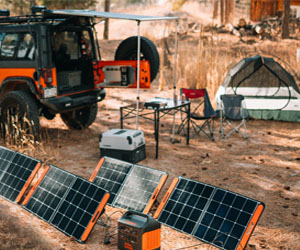


Powering Your Home Sustainably

In an era marked by a growing awareness of environmental issues and increasing energy demands, residential solar solutions have emerged as a sustainable and eco-friendly way to meet our energy needs. Harnessing the power of the sun not only reduces our carbon footprint but also offers numerous benefits to homeowners. This article explores the world of residential solar solutions and how they can revolutionize the way we power our households.
The Rise Of Solar Power
Solar power has become a mainstream energy source, and its use in residential settings is on the rise. Homeowners are increasingly turning to solar panels to generate their electricity, and it's not difficult to understand why. Solar power offers an array of advantages, making it an attractive choice for environmentally conscious individuals.
Eco-Friendly Energy
One of the primary benefits of residential solar solutions is their eco-friendliness. Solar panels harness the energy of the sun, a renewable resource, and convert it into electricity. Unlike traditional fossil fuels, solar power does not produce harmful emissions, making it a clean and green energy source. By switching to solar energy, homeowners significantly reduce their carbon footprint and contribute to a healthier planet.
Lower Energy Bills
Solar panels not only benefit the environment but also your wallet. Once you've invested in a solar panel system for your home, you'll enjoy reduced energy bills. Solar power systems can generate a substantial portion of your electricity needs, which means you'll buy less power from the grid. In some cases, excess energy generated by your solar panels can even be sold back to the grid, potentially turning your electricity meter in your favor.
Energy Independence
Residential solar solutions offer homeowners a degree of energy independence. You're no longer entirely reliant on your utility company for electricity. Solar panels can produce power during daylight hours, even during power outages, ensuring a more constant supply of electricity. With the addition of energy storage solutions like batteries, you can store excess energy for use at night or during cloudy days.
Increased Property Value
Another compelling reason to consider residential solar solutions is the potential increase in property value. Solar-equipped homes are often more attractive to buyers, as they come with built-in energy savings. Solar panels can add value to your property, which is particularly important if you plan to sell your home in the future.
Government Incentives
To encourage the adoption of solar power, many governments offer incentives, tax credits, and rebates to homeowners who install solar panels. These financial incentives can significantly offset the initial cost of solar panel installation, making it a more accessible and affordable option.
Residential solar solutions are not just a trend; they are a practical and eco-friendly solution for homeowners looking to reduce their carbon footprint, lower their energy bills, gain energy independence, and increase their property value. With government incentives and the advancements in solar technology, the transition to solar power has never been more accessible. If you're considering going solar, consult with a reputable solar installation company to assess your needs and explore the options available for your home. Embracing residential solar solutions is not only a smart financial move but also a powerful step towards a more sustainable and eco-conscious future.
Maximize Your Space And Minimize Clutter
 2. Wall-Mounted Shelves And Storage
2. Wall-Mounted Shelves And Storage
Utilize vertical space by installing wall-mounted shelves and storage units. These not only provide additional storage but also free up floor space, making your room feel more open and less cluttered.
3. Under-Bed Storage
Your bed can be more than just a place to sleep. Consider using the space underneath for storage. Under-bed drawers or bins are excellent for storing clothing, shoes, and other items you don't use daily.
4. Compact Kitchen Appliances
In a small kitchen, compact appliances can save valuable counter and cabinet space. Look for smaller refrigerators, slim dishwashers, and mini appliances that fit your needs without dominating your kitchen.
5. Fold-Down Tables
Fold-down tables are perfect for small dining areas or home offices. They can be easily stowed away when not in use, creating more room for everyday activities.
6. Pegboards And Hooks
Pegboards and hooks can be a game-changer for organizing and storing items like kitchen utensils, tools, or office supplies. These space-saving solutions keep your essentials within arm's reach without cluttering up drawers or countertops.


A Small Step Toward A Sustainable Future
 Sustainable Ingredients: Planet-conscious cleaning products use sustainable, biodegradable ingredients that break down naturally without harming ecosystems. This reduces the impact on waterways, marine life, and overall environmental health.
Sustainable Ingredients: Planet-conscious cleaning products use sustainable, biodegradable ingredients that break down naturally without harming ecosystems. This reduces the impact on waterways, marine life, and overall environmental health.
Conservation Of Resources: By choosing eco-friendly cleaning practices, we can reduce water and energy consumption. This is crucial for conserving precious resources and reducing our carbon footprint.
Effective Planet-Conscious Cleaning Practices
Eco-Friendly Cleaning Products: Seek out cleaning products that have earned eco-friendly certifications, like the "EcoLogo" or "Green Seal." These certifications ensure that the products meet rigorous environmental and health standards.
Homemade Cleaning Solutions: Making your own cleaning solutions from ingredients like vinegar, baking soda, lemon juice, and essential oils is an excellent way to embrace planet-conscious cleaning. These natural components are effective for various cleaning tasks and are safe for your health and the environment.
Reusable Cleaning Tools: Invest in high-quality reusable cleaning tools such as microfiber cloths, mop heads, and scrubbing brushes. These tools efficiently capture dirt and dust, reducing the need for disposable cleaning supplies and cutting down on waste.
Energy-Efficient Cleaning Appliances: Choose energy-efficient cleaning appliances, such as vacuum cleaners and steam cleaners, to reduce energy consumption while maintaining effective cleaning power.
Turning Scraps Into Garden Gold
 Suppresses Plant Diseases: Compost contains beneficial microorganisms that can help prevent soil-borne diseases and reduce the need for chemical pesticides.
Suppresses Plant Diseases: Compost contains beneficial microorganisms that can help prevent soil-borne diseases and reduce the need for chemical pesticides.
Reduces Waste: Composting diverts kitchen and yard waste from landfills, reducing the production of harmful methane gas and lessening the burden on waste disposal systems.
Getting Started With Composting
Select A Composting Location: Choose a suitable spot in your garden or yard for your compost bin or pile. It should be well-drained and accessible for regular turning.
Collect Compostable Materials: Gather kitchen scraps (fruit and vegetable peels, coffee grounds, eggshells), yard waste (leaves, grass clippings, small branches), and other organic materials (paper, cardboard). Avoid meat, dairy, and diseased plants, as these can attract pests and pathogens.
Layer The Materials: Alternate between green (nitrogen-rich) and brown (carbon-rich) materials in your compost pile. This balance provides the right C:N ratio (carbon to nitrogen) for efficient decomposition.
Aerate And Turn: Regularly turn your compost pile with a pitchfork or aeration tool to introduce oxygen and promote decomposition. A well-aerated pile minimizes unpleasant odors and speeds up the composting process.
Maintain Moisture: Keep your compost pile moist but not waterlogged. If it becomes too dry, it won't decompose effectively. If it's too wet, it can become smelly and anaerobic.
The Key To Vitality
 The Significance Of Nutrient Absorption
The Significance Of Nutrient Absorption
Nutrient absorption is the bridge between the food we eat and the nutrients our bodies need to function optimally. It is crucial for maintaining health, supporting growth, and providing energy for daily activities. Without effective nutrient absorption, the body would struggle to obtain the vital elements required for various bodily functions.
The Digestive System's Role
The process of nutrient absorption begins in the digestive system, where food is broken down into smaller molecules through mechanical and chemical digestion. The small intestine, in particular, plays a central role in nutrient absorption. Its walls are lined with tiny finger-like projections called villi, which are covered in even smaller hair-like structures known as microvilli. These structures increase the surface area available for nutrient absorption.
Types Of Nutrients Absorbed
Several types of nutrients are absorbed during digestion, including:
Innovations For A Sustainable Future
 The Importance Of Water-Saving Technologies
The Importance Of Water-Saving Technologies
Water is a finite and precious resource, and the need for water-saving technologies is underscored by several key factors:
Water Scarcity: Many regions worldwide face water scarcity, where the demand for water exceeds the available supply. This challenge is exacerbated by population growth, urbanization, and climate change.
Sustainability: Sustainable water management practices are crucial to ensure the long-term availability of clean water for future generations and to protect ecosystems that rely on water resources.
Efficiency: Efficient water use is not only environmentally responsible but also financially advantageous, as it leads to cost savings for individuals, businesses, and communities.
Water-Saving Technologies And Innovations
Low-Flow Fixtures: Low-flow faucets, showerheads, and toilets use innovative design and technology to reduce water consumption without sacrificing performance. These fixtures limit water flow while maintaining water pressure.
Smart Irrigation Systems: Advanced irrigation technologies use sensors and data analysis to optimize watering schedules and ensure that landscapes receive the right amount of water. This reduces water wastage from over-irrigation.
Greywater Recycling: Greywater systems capture and treat wastewater from sinks, showers, and washing machines, recycling it for non-potable uses such as toilet flushing or landscape irrigation.
A Glimpse Into Tomorrow's Living Spaces
 A Symphony Of Automation And Connectivity
A Symphony Of Automation And Connectivity
The home of the future is a symphony of automation and connectivity. It's a place where technology seamlessly integrates into every aspect of daily life. From the moment you wake up, your home is ready to assist you. Imagine a home where the lights gradually brighten to mimic the natural sunrise, and your coffee maker starts brewing your morning cup as your alarm goes off. This level of automation is now possible thanks to smart home technologies.
Smart Home Upgrades
One of the key elements of the home of the future is the plethora of smart home upgrades available today. These upgrades have revolutionized the way we interact with our living spaces. From intelligent thermostats that adapt to our preferences to security systems that keep a vigilant eye on our property, these technologies hold the potential to elevate our homes into spaces of the future.
Personalized Living
The home of the future is all about personalization. With smart technologies, your home can learn your habits and adapt to your preferences. For example, smart thermostats can create a tailored heating and cooling schedule based on your daily routines. This not only enhances your comfort but also leads to energy savings, making your home more efficient and eco-friendly.
A Call To Action For A Sustainable Future
 3. Pollution: Environmental pollution, including air, water, and soil pollution, is a significant concern. It adversely impacts human health, disrupts ecosystems, and damages wildlife. Initiatives to reduce pollution, stricter regulations, and sustainable practices are essential to mitigate these effects.
3. Pollution: Environmental pollution, including air, water, and soil pollution, is a significant concern. It adversely impacts human health, disrupts ecosystems, and damages wildlife. Initiatives to reduce pollution, stricter regulations, and sustainable practices are essential to mitigate these effects.
4. Biodiversity Loss: The loss of biodiversity due to habitat destruction, pollution, and invasive species is a significant concern. Biodiversity is essential for ecosystem stability, resilience, and human well-being. Conservation efforts and sustainable land management are crucial for addressing this issue.
5. Resource Depletion: The excessive consumption of natural resources, such as freshwater, minerals, and fossil fuels, is depleting the Earth's finite reserves. Transitioning to a more circular economy, where resources are recycled and reused, is a solution to this pressing problem.